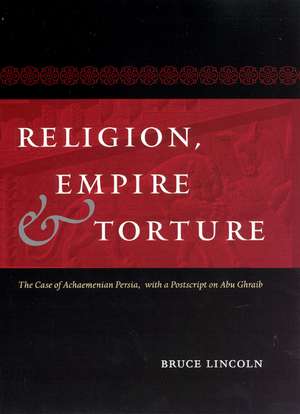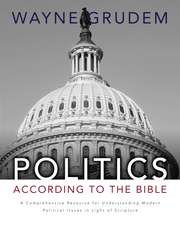Religion, Empire, and Torture: The Case of Achaemenian Persia, with a Postscript on Abu Ghraib
Autor Bruce Lincolnen Limba Engleză Paperback – 9 feb 2015
How does religion stimulate and feed imperial ambitions and violence? Recently this question has acquired new urgency, and in Religion, Empire, and Torture, Bruce Lincoln approaches the problem via a classic but little-studied case: Achaemenian Persia.
Lincoln identifies three core components of an imperial theology that have transhistorical and contemporary relevance: dualistic ethics, a theory of divine election, and a sense of salvific mission. Beyond this, he asks, how did the Achaemenians understand their place in the cosmos and their moral status in relation to others? Why did they feel called to intervene in the struggle between good and evil? What was their sense of historic purpose, especially their desire to restore paradise lost? And how did this lead them to deal with enemies and critics as imperial power ran its course? Lincoln shows how these religious ideas shaped Achaemenian practice and brought the Persians unprecedented wealth, power, and territory, but also produced unmanageable contradictions, as in a gruesome case of torture discussed in the book’s final chapter. Close study of that episode leads Lincoln back to the present with a postscript that provides a searing and utterly novel perspective on the photographs from Abu Ghraib.
Lincoln identifies three core components of an imperial theology that have transhistorical and contemporary relevance: dualistic ethics, a theory of divine election, and a sense of salvific mission. Beyond this, he asks, how did the Achaemenians understand their place in the cosmos and their moral status in relation to others? Why did they feel called to intervene in the struggle between good and evil? What was their sense of historic purpose, especially their desire to restore paradise lost? And how did this lead them to deal with enemies and critics as imperial power ran its course? Lincoln shows how these religious ideas shaped Achaemenian practice and brought the Persians unprecedented wealth, power, and territory, but also produced unmanageable contradictions, as in a gruesome case of torture discussed in the book’s final chapter. Close study of that episode leads Lincoln back to the present with a postscript that provides a searing and utterly novel perspective on the photographs from Abu Ghraib.
Preț: 225.73 lei
Nou
Puncte Express: 339
Preț estimativ în valută:
43.20€ • 44.63$ • 35.95£
43.20€ • 44.63$ • 35.95£
Carte tipărită la comandă
Livrare economică 25 martie-08 aprilie
Preluare comenzi: 021 569.72.76
Specificații
ISBN-13: 9780226251875
ISBN-10: 022625187X
Pagini: 192
Ilustrații: 12 halftones, 11 line drawings, 13 tables
Dimensiuni: 152 x 229 x 15 mm
Greutate: 0.28 kg
Editura: University of Chicago Press
Colecția University of Chicago Press
ISBN-10: 022625187X
Pagini: 192
Ilustrații: 12 halftones, 11 line drawings, 13 tables
Dimensiuni: 152 x 229 x 15 mm
Greutate: 0.28 kg
Editura: University of Chicago Press
Colecția University of Chicago Press
Notă biografică
Bruce Lincoln is the Caroline E. Haskell Professor of Divinity at the University of Chicago, where he is an associate at the Center for Middle Eastern Studies and sits on the Committees on the History of Culture and the Ancient Mediterranean World. He is the author of nine books, including Theorizing Myth: Narrative, Ideology, and Scholarship and Holy Terrors: Thinking about Religion after September 11, both published by the University of Chicago Press.
Cuprins
List of Illustrations
Preface
1 Introduction
2 Center and Periphery
3 God’s Chosen
4 Creation
5 Microcosms, Wonders, Paradise
6 The Dark Side of Paradise
Postscript: On Abu Ghraib and Some Related Contemporary Matters 000
Notes
Bibliography
Index
Recenzii
“Bruce Lincoln gives us not only what is specific to the Achaemenids, imperfectly grasped by their contemporaries and rarely recognized by moderns, but also what is common to many empires, including the hopeful illusions of benign purpose and the pitfalls of success in the historical world. Within this work of literary and historical analysis, made possible by erudite mastery of many streams of knowledge from the past, Lincoln sets a moral lesson made necessary by knowledge of the present.”
"An absorbing interpretation of the Achaemenid ideology. The system of Persian beliefs and concepts, as presented by the author, constructs an incredibly coherent and clear vision. The book constitutes a revealing guide to understanding religious aspects of royal Achaemenid inscriptions. Thus it explores in a very erudite and thorough way an area rarely investigated . . . the relation between empire and religion. . . . His book is not only a source of reliable knowledge and understanding of ancient culture, but also a stimulus for reflection."
"Lincoln has written a compelling and readable account of Achaemenid imperial ideology and a book that can be profitably read by historians, classicists, and Iranists alike."
"Lincoln has done a masterful job of reconstructing the religious and political ideology of the Achaemenian empire, bringing to the task his own sharp sense of the power of religious ideas to motivate and justify historical agents. . . . A solid contribution to our understanding of the tightly interwoven religious beliefs and political values of the first Persian empire."













